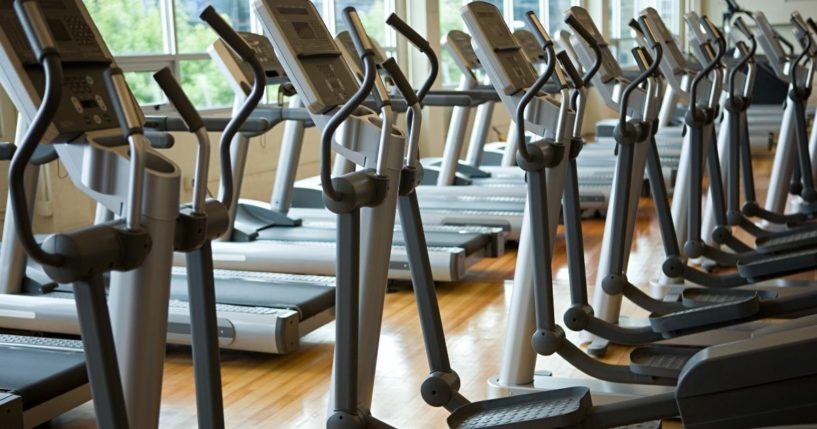
The Best Weapon Against COVID Isn't Hydroxy or Ivermectin - It's Something Woke Leaders Will Never Tell You
Since the very beginning of the COVID-19 pandemic in March 2020, public health has been advertised on virtually every news channel and street corner.
As more evidence emerges regarding the most serious COVID cases, however, it is impossible not to wonder whether the focus has been centered on the wrong issues.
In the context of the coronavirus, the words “public health” have become synonymous with practices meant to “slow the spread.” Masking, social distancing and vaccinating are the best way to stay “healthy,” according to the experts.
The problem is America is not a healthy country. In fact, the United States has the highest obesity rate of any major country in the world.
Obesity in America
According to World Population Review, America’s obesity rate is 36.2 percent, which is the 12-highest in the world. The site defined obesity as having a body mass index of 30 or higher.
Of the 11 countries with higher obesity rates than the United States, 10 of them have populations of approximately 200,000 or fewer. The only exception is Kuwait, whose population of 4.3 million has an obesity rate of 37.9 percent.
Indonesia and Pakistan, the two countries with populations closest to the United States, each have obesity rates under 9 percent. China, the largest country in the world, has an obesity rate of 6.2 percent. In other words, among major countries, America has by far the highest obesity rate.
“When it comes to fast food, when it comes to processed foods, exercise, etc., people are starting to get healthier, but we are one of the fattest nations on the face of the earth,” said The Western Journal’s medical contributor, Dr. Omar L. Hamada.
But while that issue is well-established in the medical field, it hasn’t seemed to have made much headway with politicians.
Discouraging Exercise During the Pandemic
Instead of advocating truly healthy lifestyles, many public health experts and politicians alike used their platforms to push policies at the beginning of the pandemic that made it extremely difficult to exercise. Gyms were closed for months on end, and when they did open, they were subject to drastic restrictions.
In North Carolina, for example, Gov. Roy Cooper mandated gym-goers wear masks while exercising, including running on the treadmill. According to WCNC-TV, that requirement directly contradicted guidance on the World Health Organization’s website, which said that masking while exercising is unsafe.
“There are people for whom wearing a mask and attempting even moderate level intensity exercise would be prohibitively dangerous,” said Rob Jenkins, co-founder of Hive Fitness in Charlotte.
All of these restrictions undoubtedly made many people less likely to exercise, which is not a great way to promote healthy lifestyles.
“Forty percent [of Americans] are obese, 60 percent are overweight,” Hamada said. “The rates of heart disease and stroke and diabetes continue to increase.
“So just from a preventive health standpoint, that doesn’t seem to be an area that we’ve been able to make any difference over the past three or four decades. In fact, we’re losing that war.”
In the battle against diseases like COVID-19, exercise can be used as an important weapon. Instead, leaders and “experts” disincentivized exercise and said they were doing so in the name of public health.
It’s possible this messaging played a role in the severity of the pandemic. A closer look at the COVID-19 data reveals a clear correlation between obesity rates and death rates from the virus.
Obesity Correlates with COVID-19 Severity
According to the British Medical Journal, a study from the World Obesity Federation examining deaths from the virus through February found that 2.2 million of the 2.5 million recorded deaths at the time occurred in countries where over half of the population had a BMI over 25 — the threshold for “overweight.”
Furthermore, the correlation between the virus’ mortality rate and the percentage of overweight adults was consistent in the data from over 160 countries.
“There is not a single example of a country with less than 40% of the population overweight that has high death rates (over 10 per 100,000), the report said. Similarly, no country with a death rate over 100 per 100,000 had less than 50% of their population overweight,” BMJ wrote.
The journal went on to give examples of countries with low death rates, all of which had low percentages of the population who were overweight. Vietnam boasted the lowest COVID-19 death rate in the world at just .04 per 100,000, and the 18.3 percent of adults in the country who were overweight put Vietnam second-lowest in that category.
Meanwhile, the U.K. suffered the third-highest death rate at 184 per 100,000. The nation also ranks fourth-highest in the world with 63.7 percent of the population classified as overweight.
In another study, the Infectious Disease Clinical Research Program compared obese and non-obese patients among U.S. Military Health System beneficiaries who had tested positive for COVID-19.
Of the 511 patients in the study, 24 percent were obese and 14 percent were severely obese. The study found obese patients were more likely to need hospitalization and oxygen therapy than non-obese patients.
“Obesity is correlated with COVID-19 severity, SARS-CoV-2 viral load, and anti-spike IgG antibody responses,” the study concluded. “These findings offer new pathophysiological insights into the relationship between obesity and COVID-19 severity.”
Despite this study and countless others establishing the correlation between obesity and severe COVID-19 cases, Hamada said Americans are still not getting the message.
“I think if we went out and asked most anybody on the street … what are the top three worst indicators of how someone’s going to do with COVID, I think most people are going to say obesity is one of the top ones,” he said. “So I think the messaging is getting out there, but I don’t know that it’s effective.”
Celebrating Obesity in the Media
One thing that could lessen the effectiveness of any health campaign is mixed messaging. While many doctors and medical professionals have tried to explain the health risk obesity presents, some outlets have appeared to almost celebrate obesity.
In Cosmopolitan’s February issue, for example, the magazine depicted multiple overweight women on the covers with the caption “This is healthy!” Many Twitter users took issue with that messaging during a time when COVID-19 was running rampant.
can you imagine printing this during COVID-19? pic.twitter.com/w8XT1PJafk
— Brent A. Williams, MD (@BrentAWilliams2) July 29, 2021
#1 cause of #covid death is obesity ??♀️
But like, put #bodypositivity on the casket or something. @Cosmopolitan pic.twitter.com/aoyjxbECBB
— Nicole Arbour (@NicoleArbour) January 4, 2021
Despite evidence of a correlation between obesity and severe COVID-19 cases, outlets like Cosmopolitan have attempted to justify unhealthy lifestyles through “body positivity” messaging.
As time goes on, it is likely COVID-19 will continue to be a part of everyday life, albeit to a lesser extent. Dr. Anthony Fauci, director of the National Institute of Allergy and Infectious Diseases, has been saying as much over a year now.
“I don’t see this disappearing the way SARS-1 did,” he said of COVID-19 in July 2020. “I think we ultimately will get control of it; I don’t really see us eradicating it.”
If the coronavirus is going to be around for years to come, many people will want to take the necessary steps to protect themselves against the most severe cases. Research shows a great way to do that is to promote healthy lifestyles and exercise, not obesity.
Truth and Accuracy
We are committed to truth and accuracy in all of our journalism. Read our editorial standards.
Advertise with The Western Journal and reach millions of highly engaged readers, while supporting our work. Advertise Today.












